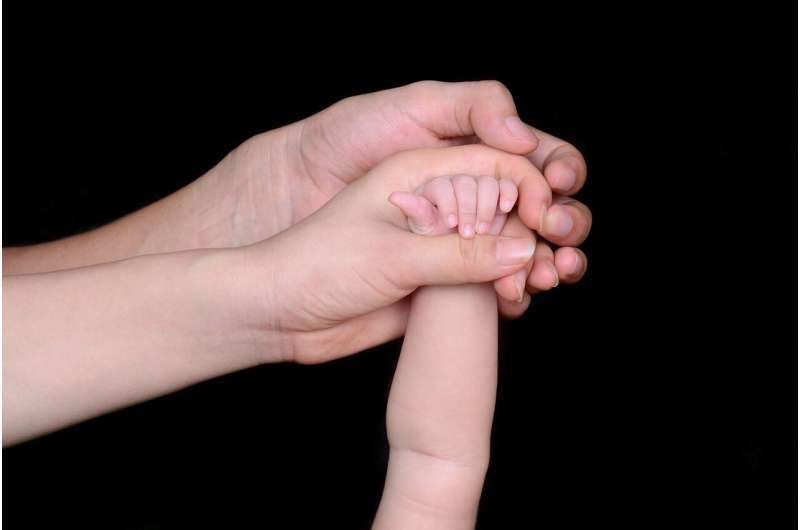Study shows gender skew in digital info for new parents

Today’s parents-to-be use online tools for health guidance in the same way their parents once dog-eared pages of the What to Expect book series.
But a new study has found it’s new moms who most often devour digital guidance about parenting—while dads-to-be rely on their women partners to sift and curate information for them.
The result: online parenting sources have become a perpetually pink domain aimed mostly at new mothers, and only parenthetically directed at new dads.
The paper, ‘Let me know when I’m needed,’ published in the journal Digital Health, examines who in the early-parenting journey seeks online health advice, and where they find it.
“Our study identifies how much digital technology can reinforce and entrench stereotypical parenting roles. Usually, mom-to-be finds the health information, then curates it for the dad—and that doesn’t necessarily serve the interests of the baby or either parent,” said nursing professor Lorie Donelle, one of the principal investigators of the Transition to Parenting within the Digital Health Context study.
Gender-skewed apps
The study recruited couples who had become new parents within the previous 24 months and asked them to describe the type of technologies they and their partners used during their transition to parenthood.
Study participants, all heterosexual females, primarily used digital technologies to find a supportive community and to seek health information about ovulation tracking, fetal development, infant feeding, infant health, developmental milestones and maternal health.
One key finding, Donelle said, is that gender bias is often built into popular parenting apps, from pre-conception to post-partum.
“Almost all of them are very ‘female.’ Even the colour schemes are yellow or pink and have flowers.”
By contrast, the few apps and sites available aimed at men often strive for humour and traditionally masculine symbols (one app describes it as ‘dude-friendly’ updates, while another promises ‘fewer dainty details about girly bits’).
Where ‘mommy’ apps may have detailed descriptions of fetal anatomical growth and neurological development, for example, a daddy app uses sports balls for fetal size comparisons.
“It didn’t seem that fathers, in our estimation, were well-supported in parental-preparation apps we examined,” noted Donelle, professor and Arthur Labatt Family Chair in Nursing in the Arthur Labatt School of Nursing in Western’s Faculty of Health Sciences.
Accountability and expectations
Mothers-to-be also noted a gender skew, even to the sites’ curated images of manicured mothers cradling cooing newborns.
“Women participants said, ‘this (information) is filled with societal expectations of what defines a good mother and good mothering. A good mother is supposed to look for health information for herself and her baby.’
“But they didn’t feel their partner had the same accountability for health and information-gathering,” Donelle said.
One participant said her partner had asked her to find and pass relevant information to him and let him know when he was needed for anything.
Another recounted sending her partner “lots of articles and they just got lost in his inbox.”
The paper suggests more than indifference is at play: often, future fathers don’t see themselves represented in the available resources or they believe father-focused resources aren’t as serious or as trustworthy as mother-focused apps or sites.
Paradoxically, then, the digital technologies that help support women in their transition to parenting end up perpetuating their role as health-information seekers and curators.
‘Fully engage all parents’
The gender imbalance of the study group illustrates part of the issue, Donelle said. “Our call to recruit parents was open to all parents—and only mothers responded (initially). We had to work especially hard to find even a couple of father participants.”
The other notable point, said Donelle, is that whole families sometimes rely on the veracity of online advice, without realizing it may come from a range of sources with vested interests.
“Many of our participants are using this online information in addition to, or in the absence of, immediately available information from a health professional.
“There are so many apps and tools that are available that it’s really difficult to sift through the tsunami of information to find what is accurate.”
She said the study isn’t intended to judge the technology but to understand how tech—whether it’s phone apps or baby monitors—can be more be supportive of parents and children.
“We need to have an awareness of what these digital tools show us about the expectations of parenting. And we need to fully engage all parents. All parents need to see themselves reflected in the information that’s available.”
Source: Read Full Article
